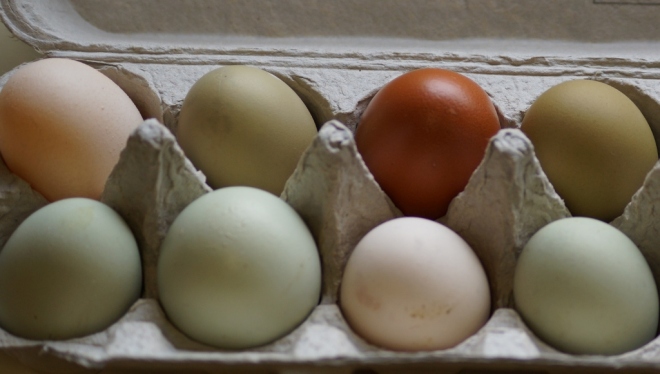
Easter brings to mind colored eggs . . . and that’s just what has been popping out at Grieb Ranch lately; a variety of colored eggs! Yet we’re still a few months from Easter.
So how does an egg get its natural color?
The short answer is genetics. Connie has been having fun crossing several different chicken breeds which is producing some really lovely egg colors.
Detailed information regarding egg color comes from Michigan State University Extension
All eggs start out white in color; those that are laid in shades other than white have pigments deposited on them as the eggs travel through the hen’s oviduct. The journey through the chicken’s oviduct takes approximately 26 hours.
The shell takes roughly 20 hour to be complete. Ameraucana birds have the pigment oocyanin deposited on the egg as it travels through the oviduct. This pigment permeates the egg shell resulting in the interior and exterior of the egg being the same blue color.
Chickens that lay brown tinted eggs deposit the pigment protoporphyrin on the eggs late in the process of forming the shell. The pigment therefore does not penetrate the interior of the egg, but tints only the surface of the egg, which is why brown eggs are white on the interior.
In the case of an Olive Egger, a brown pigment overlays a blue egg shell resulting in a green egg. The darker the brown pigment the more olive color of the resulting egg.
Are green eggs better than white? Are brown eggs good?
There is no difference in edibility, health, or nutrition with different-colored egg shells. The real difference in eggs taste comes from the hen’s environment and diet.
My Pet Chicken has this to add about backyard chicken eggs:
The colorful eggs from your backyard hens WILL have much more nutrition, because eggs produced by hens raised on pasture are much healthier, indeed (and they taste much better, too).
Keep in mind that commercially produced “free range” eggs may have been laid by hens who have never seen a blade of grass, the sun or the sky. “Pasture-raised” is something different, and much healthier.
Eggs laid by hens raised on pasture have less fat and cholesterol, and more healthy vitamin A, vitamin E, beta carotene and omega-3s. You can read all about the nutritional differences between factory farmed eggs and real, eggs to get an idea of what all those people who have to eat those icky grocery store eggs are missing!
So keep this in mind the next time you are at the grocery store and brown eggs are packaged in the egg cartons. They are just the same as the white ones. Also if you get the chance to eat a real farm-raised egg, savor the experience.
